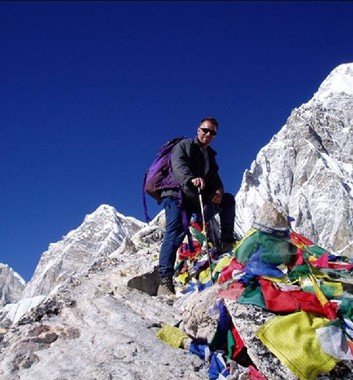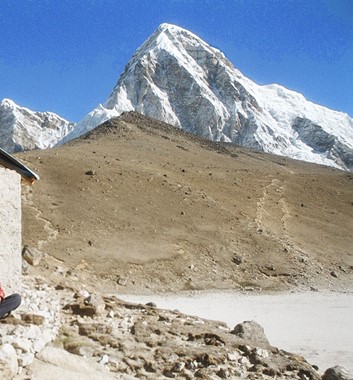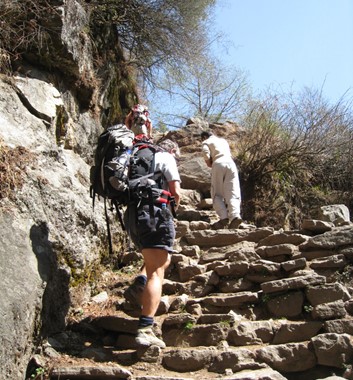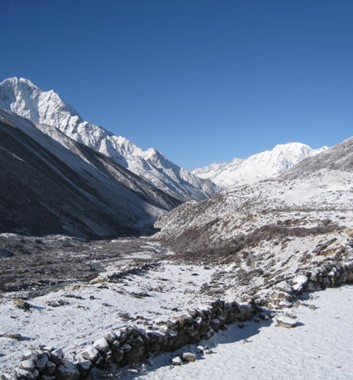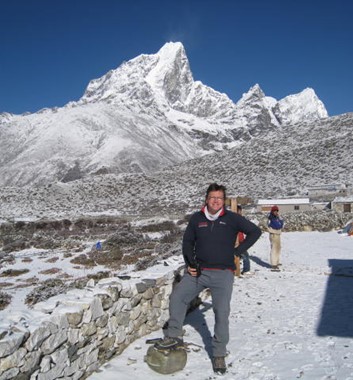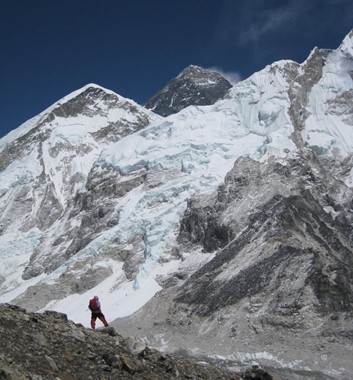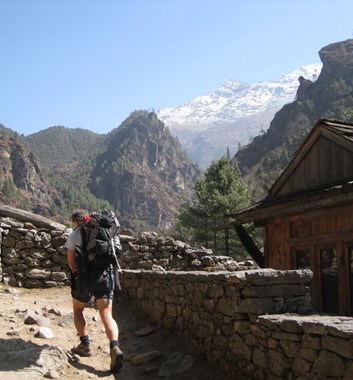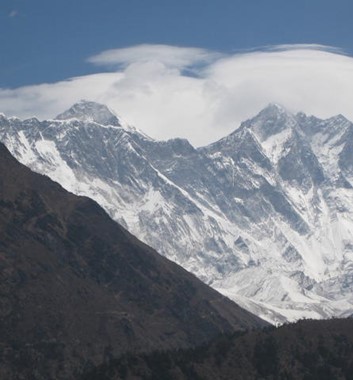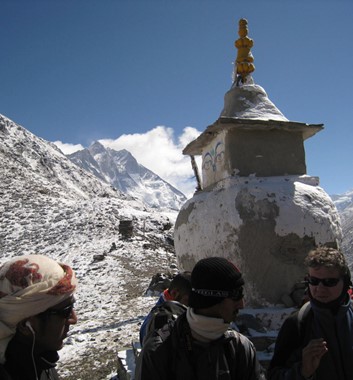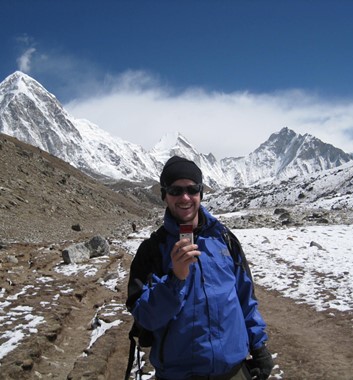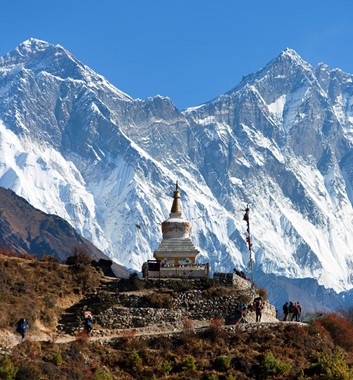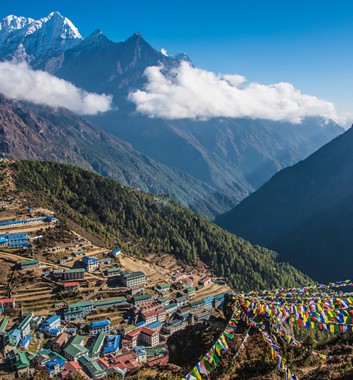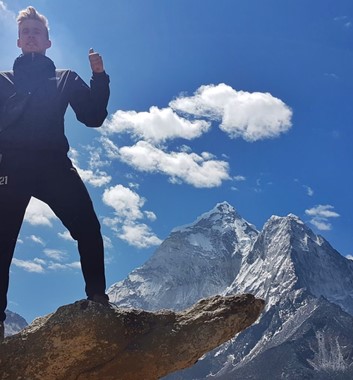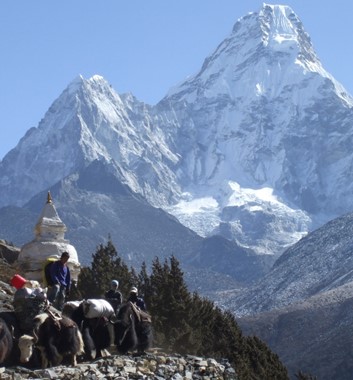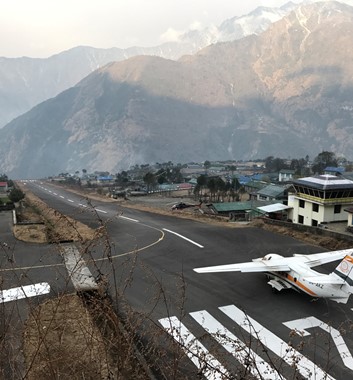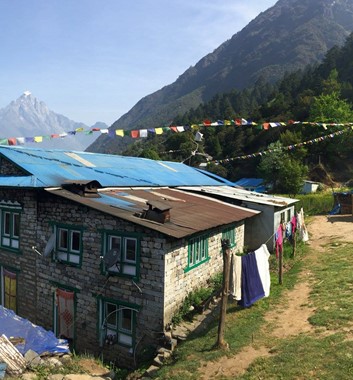Overview
The seduction of a trek to Everest base camp has long been known in adventure travel for its unmatched views of Everest, immersed in the peaceful world of Tibetan Buddhism and framed by the majestic Himalayas. This classic Everest trek through the Khumbu valley offers more than just a walking holiday; it is for many a pilgrimage to the highest mountain in the world, in a remarkable country which will leave you with vivid memories of the people who live there.
We have a long history with this region of Nepal. We have been running treks and climbs to Mount Everest since 2000 and started our own company based in Kathmandu. You will be in good hands with excellent travel advice and tips on weather conditions and what to expect. We also provide the trekking permits in advance of your visit.
Summary of Everest Base Camp trek itinerary
Days 1 & 2 : Arrival and preparation/rest day/ sightseeing in Kathmandu
Days 3 - 11 : Fly to Lukla and trek up to Everest Base Camp
Days 12 - 15 : Trek back down to Lukla
Days 16 - 17 : Fly back down to Kathmandu & depart
You can trek to Everest Base Camp from March to early June, and September to early December.
Kathmandu is at an approximate altitude of 1400m and the flight to Lukla will take you up to a height of 2866m. With Everest Base Camp standing at 5360m and Kala Patthar at 5545m, the base camp trek gains a total of 2679 metres from Lukla and 4145 metres from Kathmandu.
Everest Base Camp Trekking Route Map
If you click the image below you'll see a bigger version of our Khumbu Trekking routes map. The route for Everest Base Camp starts in Lukla going through Phakding, Namche Bazar, Tengboche, Dingboche, Dughla, Lobuche, Gorak Shep before reaching Everest Base Camp. The return route is the same though the views are just as enjoyable as you walk in the opposite direction. We do also offer variations on the standard route such as the Gokyo Route and the more challenging Three Passes and Three Peaks route. It's also possible to start lower down than Lukla by trekking from Jiri or Phaplu. You could also spend some time in the villages of Bumburi and Bupsa where our charity, Moving Mountains, has been working for several decades.
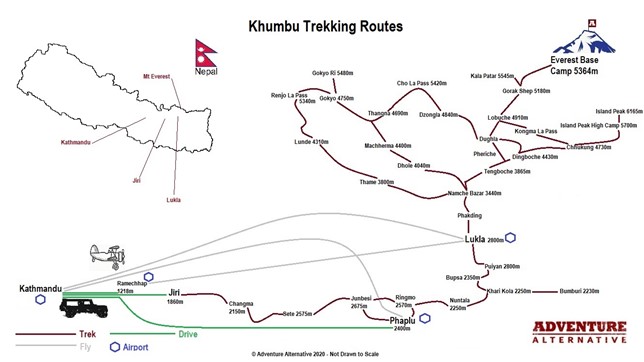
(click the image for a larger version)
Also have a look at our Virtual 360 degree online tour to Everest Base Camp by clicking here
Everest Base Camp Trek Length and Terrain
The total distance covered throughout the Everest trek is approximately 92 kilometres. Every day the trek starts after breakfast at about 8.30am and there are many opportunities to stop and take photos or have a cup of tea along the trail. The pace is slow and the itinerary allows for excellent acclimatisation and includes two rest days on ascent. At the start of the trek the distances are short but there are a few hills but again we take our time and there's no rush. As we get higher the distances increase but the gradient is more consistent and even. Most days trekking is finished by early to mid afternoon.
Many people thing they have to 'climb' to Everest Base Camp, but it's purely a trek. The terrain is along well trodden and defined paths. The last section is on glacial moraine, which is covered in crushed rocks and presents no need for crampons or technical equipment. There are no precipitous drops that require ropes, though there are a few high footbridges that crosses the Dudh Kosi river several times below Namche Bazar. In the past these were rickety wooden affairs, however nowadays they've been replaced by well engineered and constructed metal walkways that are high sided and very secure.
Everest base camp trek altitude profile
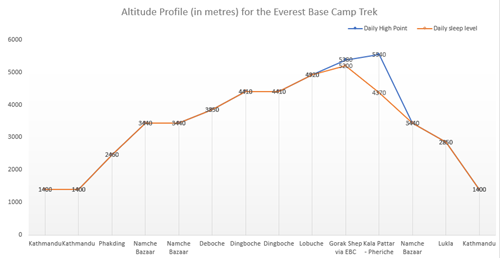
(click the image for a larger version)
Accommodation on the Everest base camp trek
Accommodation is in comfortable lodges (formerly known as tea houses) which are run by Sherpa families, unless people specify a preference for tents. Each lodge has a central communal area with a large stove that provides heat and a cosy atmosphere. The bedrooms are unheated and generally have two beds with mattresses, pillows and a blanket. You will need to bring a sleeping bag (3 season is normally enough) and we'd recommend a pillow case.
The lodges generally have showers which are powered by gas and they mostly use sit down flush toilets (some lodges do also have squat toilets). Food on an Everest Base Camp trek is very good quality, a mixture of local Nepali / Sherpa food and western recipes. Burgers and chips are a common meal, as is dal bhat with rice. You will find everything from fresh pastries to beer, stir fries to deep fried Mars bars available in the lodges and shops a Nepal price guide can be found here. And there are many shops selling all types of drinks and snacks, sweets and chocolate. The biggest challenge will be avoiding all the unhealthy foods and sticking to a simple diet of rice and dal!
Packing List for Everest Base Camp
Check out our gear recommendations and also our Nepal Trekking Kit List page for information about what gear and clothing we recommend.
The basic idea of the clothing you will take is to keep you warm, dry, protected from the sun, able to move comfortably in the mountains and able to be comfortable in the evenings and night. The main points to cover are as follows:-
- Bags - Rucksack or duffle bag for a porter to carry plus a day pack to be carried by you. Dry bags inside to store clothes.
- Rain protection - Top and bottom waterproofs to keep off wind/rain, also an umbrella
- Layers - Shirts, trousers, shorts, T-shirts, jumpers and jackets, hat and gloves.
- Walking - Comfortable boots with a good sole and ankle support. Lighter footwear to change into in the evenings. Trekking poles
- Sleeping - 3 or 4 season is enough in the lodges where there are beds and mattresses and blankets
- Water - Water bottles should be hard plastic (Nalgene), not throwaway bottles. Water can be boiled or treated.
- Personal hygien - wash kit, towel, small first aid kit
- Sun protection - sunglasses, sunhat
- Miscellaneous - head torch, camera, books, music, power bank and leads
Kathmandu has an area called Thamel which is full of hundreds of equipment shops, each one an emporium of new, used, quality and fake equipment all very reasonably priced for rental and buying. You can buy almost anything needed for any trek.
Frequently Asked Questions (FAQs) for trekking to Everest Base Camp
Below are a few commonly asked questions but do also check out our 'Related Blogs' section and also the 'More Information' section also on this page. which covers every question you may have for trekking to Everest Base Camp! The biggest question we do get asked is 'How hard is it to trek to Everest Base Camp' hence it has its very own blog.
What is the Luggage Allowance on the flight to Lukla?
Please note that the luggage limits vary on the internal flights from 15kg - 20kg for hold and hand luggage. You can take more if you wish and the excess cost ranges from$2 - $3.00 per kilo. You can of course wear your trekking boots and jacket to help cut down on the weight of your bag. You can also leave any city clothes or extra travel kit in Kathmandu at your hotel or in our office.
Heavy bags also require us to employ extra porters to carry them, if any bags are over the 15 kg weight limit you will be charged extra, which can be paid to your guide at the time, however 15kg is more than adequate to cover all your gear.
How fit do I need to be to trek to Everest base camp trek?
The Everest Base Camp trek is a well trodden path all the way, although it can be rocky and uneven in parts. It is not precipitous and there is no rock climbing or ‘mountaineering’ which requires equipment. It is a walk all the way to Everest, although some of the hills can be steep and at the time perhaps, never-ending! The final section to Everest Base Camp, on the Khumbu glacier itself, can be a bit slippery underfoot with ice and loose rock or scree. Poles are useful for balance and support.
Nothing is particularly demanding, but the combination of long days hiking and high altitude with obviously varied mountain weather, does make this trek a challenge. It's wise to be fit in advance if only to ensure your body can convert oxygen to energy more efficiently. The best advice is to go hill walking at home beforehand with a pack on, and in the gym you can work on quads and thigh muscles because the uphill slopes are quite long. The pace of the trek is slow and there is always time to rest and recover before the next section. Altitude will make you feel exhausted and you will pant and feel tired more quickly, so it's vital to follow the essential rules of safe walking at altitude - go slow, drink well, eat well, sleep well and if you feel bad then stop.
How easy is it to trek to base camp of Everest?
This Nepal trek is a feasible goal for most fit hill walkers. The paths are well trodden, they are the highways and byways of the Sherpa people, so you find yourself passing through many villages and getting up close with the culture. The average group size is six and you will have Sherpa guides and a team of porters to assist you all the way there.
It is more remote than, say, the Annapurna Circuit trek; the final part of the trek is on the Khumbu glacier itself, which ends at the camp used by climbers attempting to ascend the mountain. Over the high wall of mountains beyond base camp is Tibet, so you will have reached the northern border of the country.
There is nothing technical about the trek, no climbing or even scrambling, but the path is rocky and hilly and at the end of the trek it is on moraine and finally on the glacier itself. With a good pair of boots, there should be no need for concern though, the biggest issue is hiking at altitude and staying fit and strong for the final ascent of Kala Patthar. This is a walking holiday but the usual concerns for weather and remoteness and handling the high altitude require common sense and a slow pace.
Do have a read of our various Blogs about treks in Nepal and also the 'More Information' section, both have tabs on this page and will answer every question you may have! We also have a lot of useful information on our Nepal Preparation page.
Dates & Bookings
Itinerary
Everest base camp trek itinerary
The flight from Kathmandu to Lukla takes 35 minutes. The trek is nine days uphill, which includes two full days rest and acclimatisation to the last settlement of Gorak Shep. After visiting Everest Base Camp and climbing to the high point of Kala Pathar (for dawn views of the sun rising behind the summit of Everest), the descent is three days. We always allow a bad weather day for flying into or out of Lukla.
The start dates refer to the latest arrival date in Kathmandu and the end date refers to the earliest you can book your return flight home for.
Private trips are welcome, we can adapt the itinerary to whatever date you wish. We often take couples or small groups of two or three, but for a solo traveller there would be an extra charge.
Rest day and acclimatisation to jetlag, sightseeing plus trek briefing. Possible drive to Ramechhap** - see 'Lukla Flight' details below.
| Day | Elevation | Travel Time | Info |
|---|---|---|---|
| 1 | 1400m | None | Arrive into Kathmandu. You will be met by our staff at the airport and transfered to the hotel. Depending on your arrival time you can relax or sightsee around Kathmandu. |
| 2 | 1400m | None |
Rest and acclimatisation to jetlag; sightseeing plus trek briefing. Possible drive to Ramechhap** in the afternoon - see Lukla flight details below. |
| 3 | 2460m | 45min flight 2hrs Trek | Flight* to Lukla, walk downhill to Phakding or Monjo along the edge of the Dudh Kosi River. Easy, busy path, surrounded by forest. |
| 4 | 3440m | 5 - 6hrs | Uphill to Namche Bazaar which is the Sherpa 'capital' in the heart of the Khumbu region. Initially follow the valley to Monjo where you enter the National Park, then cross the river a few times and start a long unrelenting path uphill, with one spectacular bridge spanning a deep gorge. Leave the coniferous forest behind, and arrive at a huge natural amphitheatre with the houses spread around the sides. |
| 5 | 3440m | n/a | This is an acclimtisation day which you can rest or enjoy the sights and sounds of Namche. You can also go for short walks to the Sherpa museum and other local places of interest. |
| 6 | 3850m | 6hrs | Walk to Deboche which is near the famous Thyangboche Monastery. The path out of Namche is initially steep and then opens out into a high valley, passing through villages like Pangboche before negotiating two steep hills. After this it is a short walk to the beautiful rhododendron glade where you will find the lodge. |
| 7 | 4252m | 5hrs | A gradual gradient up to Dingboche. The path skirts the side of the valley with the river far below on your right and passing beneath the spectacular Ama Dablam. The village sits on the confluence of two valleys and is good farming land. |
| 8 | 4252m | n/a | This is another rest and acclimatisation day. In the neighbouring village of Pheriche you can visit the Himalayan Rescue Association to listen to the daily lecture on high altitude health, and get a check up from the medical staff or go on a local walk up teh valley towards Island Peak or up one of the neighbouring ridges. |
| 9 | 4920m | 5hrs | Trek up the high valley to Lobuche which is alongside the huge Khumbu Glacier. You can now easily feel the effects of the thin air as the hike takes us up to the Thukla Hills where there are many stupas erected in memory of Sherpas who have died on expeditions. |
| 10 | 5360m EBC 5200m sleep | 7hrs | Hike on the glacial moraine to the final settlement of Gorak Shep, the last outpost of a small collection of huts just below a shoulder of Mount Pumori called Kala Patthar which is our destination the following morning as it's a fine viewing point for Everest. We'll have lunch at Gorak Shep and then walk on for roughly 1.5 - 2hrs and visit Everest base camp. We trek along the lateral moraine and finally over the Khumbu glacier itself to the base camp at the foot of the Khumbu Ice Fall. |
| 11 | High point 5540m drop to 4370m | 2 + 3hrs | Early morning climb to the summit of Kala Patthar (5540m) to see sun rise behind the peak of Everest. This is a tough walk in the cold and not to be underestimated. Take warm clothing. Back at the lodge for breakfast and a walk back down past Lobuche, dropping to Pheriche at 4370m. |
| 12 to 13 | 4370m down to 2850m | ~6hrs a day | Over two days a descent via Namche Bazaar all the way to Lukla with various options for accommodation. It is possible to stay in different villages, for example Pheriche, Khumjung, Monjo, but the route is the same as the way up. |
| 14 | n/a | n/a | Additional weather day - this day is here to allow for any delays either flying into our out of the mountains. If the weather is stable you can fly down to KTM or you can spend an extra day in the mountains. Please read our Himalayan Flight Delays info page. |
| 15 | 1400m | 45mins | Lukla flight* to arrive in Kathmandu / Ramechhap in the morning and transfer to your hotel. Rest and sightseeing. |
| 16 | n/a | n/a | Depart Kathmandu. If you leave in the morning it is possible to arrive in London the same day, or arrive home on day 18. |
*Lukla Flight
The Lukla flights fly-by-sight, so if there is bad weather there can be delays, which occurs in about 30% of all trips with an average delay being 24 hours. We can be flexible and adapt the itinerary to catch up on lost days, and we include a weather day in the itinerary, but if the planes can’t fly then there is little to do except wait.
Occasionally the planes can’t fly but helicopters can; if you prefer this option, and there is group consensus, we can organise this but there would be a supplemental charge which is normally around $500 per person one way. Please look at our Delayed Flight page so you are fully informed and do consider booking your holiday for a day or so longer just in case you do end up with a delay.
*Ramechhap / Manthali Airport
Over recent years there has been a change, sometimes with little notice, regarding the airport you fly from to reach / return from Lukla. Traditionally, and still occasionally, you fly from Kathmandu airport, however there are now (mostly) regular seasonal changes that have moved the flight to depart / return from Manthali Airport, which is in a place called Ramechhap. If your flight does depart from Ramechhap we will let you know in advance, as far as possible, as this will impact your itinerary slightly, and there will be additional costs as the airport is a four hour drive from Kathmandu.
We prefer to make this journey on your rest and briefing day (day 2 of the itinerary). Some make this journey at 2am on the day you fly up to Lukla, but this can lead to you being very tired and a very long day. We prefer to drive on the afternoon of day 2 of your itinerary, so that you can relax on the morning of day 2, then enjoy the drive in daylight through the beautiful countryside and communities that you pass en route. This means you will arrive at a decent time to have dinner and get a good nights sleep before you fly up the next morning and start trekking.
If this applies to you then there are additional costs for 1) return road transport to / from Ramechhap and 2) accommodation. You will be accompanied and travel with your trek guide. You will of course save some money with one less night in your Kathmandu hotel. These costs are paid in country to our co-ordinator and they vary depending on the size of the group / vehicle required. As an estimate they can range from £70pp to £140pp for a return land journey and an overnight stay in a local hotel for you and your guide. We will book and manage all of this for you.
Cost
Everest Base Camp trek cost £1695.00
INCLUDES
- Airport transfers (to / from Kathmandu airport to Kathmandu, for international & Lukla flights)
- Internal flight
- Trek accommodation in lodges/tea houses (twin rooms with beds and mattresses)
- Three meals per day during the trek with a hot drink (additional drinks or portions are self funded)
- Fees for Sagamartha National Park and Village Development Committee, and waste management
- Sherpa guides (English speaking, professional, experienced and trained in first aid)
- Porters (max weight carried for you is 13kgs)
- Staff food, insurance, accommodation and equipment
EXCLUDES
- International flight to Kathmandu
- Accommodation in Kathmandu pre / post trek - we offer a range of options. Click here for details
- Transfers to / from Ramechhap airport 'IF' required (see 'Lukla Flights' below)
- Personal costs like meals in Kathmandu and drinks, laundry, hot showers and charging on trek
- Travel Insurance
- Additional Porters if packs are overweight - £10 per kilo
- Visa
- Tips for staff ~ £100
Please Note:
Luka Flights - Over recent years there has been a change, sometimes with little notice, of which airport you fly from to reach / return from Lukla. Traditionally, and still occasionally, you fly from Kathmandu airport, however there are now (mostly) regular seasonal changes that have moved the flight to depart / return from Manthali Airport, which is in a place called Ramechhap. If your flight does depart from Ramechhap we will let you know in advance, as far as possible, as this will impact your itinerary slightly and there will be additional costs as the airport is a four hour drive from Kathmandu.
We prefer to make this journey on your rest and briefing day. Some make this journey at 2am on the day you fly up to Lukla, but this can lead to you being very tired and a very long day. We prefer to drive on the afternoon of day 2 of your itinerary, so that you can relax on the morning of day 2, then enjoy the drive in daylight and get to see the beautiful countryside and communities that you pass through. Then arrive at a decent time to get a good nights sleep before you fly up the next day and start trekking.
If this applies to you then there are additional costs for 1) return transport to Ramechhap and 2) accommodation. You will be accompanied and travel with your trek guide. You will of course save some money with one less night in your Kathmandu hotel. The travel costs are paid in country to our co-ordinator and they vary depending on the size of the group / vehicle required. As an estimate they can range from £70pp to £140pp for a return land journey and an overnight stay in a local hotel for you and your guide. We will book and manage all of this for you.
Hotels - We don't include your hotel in Kathmandu as there is such a wide range of choice and styles for all budgets. We offer some recommendations which you can see on the Extras tab and can confirm during your booking process or after. Hotels will usually transfer you from the airport, but if not we're happy to do so.
Meals on Trek - We include three meals per day whilst on trek. It is a common practise on cheaper treks to have a food kitty which would normally add £400 - £500 per person to the cost of a trek, but we provide all meals within the trip price.
Payments - A deposit of £100.00 is required on booking to secure your place and we ask that the remaining balance (trip price minus the deposit) is paid in full 6 weeks prior to your departure. When you book with us you're given your own secure online account which you can access 24/7. Through this account you can edit your booking, add flight, health, insurance and dietary details and also make interim payments. We make payments as flexible as possible and you can choose, if you wish, to pay a bit off your trip fee whenever it suits you.
Value for money - Our prices are competitive and good value, and we offer quality, service, security and an ethical stance on tourism in a developing country. We don’t want to be so expensive to run fewer trips and have our staff idle, but on the other hand we believe that running cheap trips that promote the practice of skimming budgets would result in the porters getting next to nothing, which is something we cannot consider.
Acclimatisation - Our treks allow a good time to acclimatise and as a mountain guiding outfit we always want to ensure the trek is safe. Reducing the number of days may make the price cheaper but the chances of safely reaching base camp also greatly reduce. We follow established mountaineering principles of height gain on all treks to altitude.
Travel Insurance - As soon as you book you should purchase a policy which covers trekking to 5500m this will cover you should any unexpected events force you to cancel. Your policy should also include helicopter rescue in the event of an evacuation.
FLIGHT DELAYS IN LUKLA
The mountain flight in and out of Lukla which is where most treks begin and end in the Khumbu (Everest) region can be delayed due to bad weather. Normally it is for about 24 hours but it can be longer. We recommend you allow some time in Kathmandu after the specified day of the internal flight just in case. There is more information about Himalayan flight delays.
Some people choose to cancel the internal flight and book a helicopter which can fly below the cloud level and is not so determined by the weather. This is possible but there are no fixed prices for a seat on the helicopter. There are now around 12 helicopter companies operating and we can check them all for you.
For a one way place on the helicopter to Lukla can cost around $500.00 minimum. The cancelled portion of your aeroplane flight can be refunded and used to offset this figure, which is about $170.00 for a one way sector, so there would be a balance to pay for the helicopter. You can use your credit card to cover off this additional expenditure.
Unfortunately there is nothing we can do if the flight is delayed. Sometimes you can end up waiting in the airport from early hours to get the 'green light' to go, only to find yourself back in the hotel by mid morning. People do get very frustrated because it can impact on the trekking itinerary. A helicopter is one option, or else to wait until the weather improves. However, if it does not then very quickly a queue of people at either end can build up, and it is always hard to get priority for when the weather clears. The airline companies put as many planes on as possible to clear the backlog.
We try to assist as best we can, but it's important to accept that the route has this potential delay and also that it's advisable to book the international flight home a little later in case the delay affects your return ticket.
There is another option which is to drive to Paphlu and then take a jeep on the new road as far as it will go and then walk to Lukla. This option takes more days - two in total each way currently - and there is a saving but only of about $70 compared to the flight.
Photos
Extras

Duffle bag
These duffles are waterproof with a top zip, side handles and rucksack straps. They come in two sizes: 90 or 120 litres.

3 season sleeping bag
A good quality 3 season synthetic mummy shaped bag rated to a low of -12°C and a comfort rating of -5°C. Comes with a liner.

Trekking poles
A pair of adjustable trekking poles.

Island Peak
Ascent of Island Peak (Imja Tse), at 6189 metres one of the most iconic trekking peaks in Nepal which is semi technical requiring climbing equipment. First day up to Chukkung for any gear rental and then onto base camp to meet the Sherpa guide. Early morning start to the summit and back down to base camp and onto Chukkung. Normally 2 days in total.

Hotel Manang
3 nights twin/double standard room in the heart of Thamel in Kathmandu. Hotel Manang is a 4 star establishment with excellent facilities, spacious ensuite rooms and a good restaurant.

Yak and Yeti Hotel
3 nights twin/double standard room in this luxury 5 star hotel offering a blend of modern day sophistication and cultural heritage with its 100-year-old palace and the newly designed structure of the hotel.

Kathmandu Guest House
3 nights B&B in a standard twin or double in the famous 4 star Kathmandu Guest House in Thamel, central Kathmandu. KTMGH is set in beautiful grounds with a number of restaurants and gardens, shops and museum pieces.

Kathmandu Eco Hotel
Budget hotel near city centre, price is for 3 nights double or twin room.
Choose a scheduled date or contact us to set up private dates or a bespoke itinerary. The minimum deposit is £100.00 and the balance is due four weeks before travel.
Just a wee note to say thanks for getting my "missing bag" up the mountain for me. What initially from my perspective lo…
Read More Richard O'Donovan- Duration 17 days
- Numbers 4 - 15
- Altitude 5545m
- Distance 90km
- Challenge Moderate
- Comfort Lodges
- Nepal trek food & lodging
- Nepal trekking seasons
- Nepal Trek emergencies
- Nepal trip preparation
- Health and altitude
- Tipping advice
- Travel Insurance
- Trekking boot advice
- Acclimatising safely
- Kathmandu Accommodation
- Nepal trek kit list
- Nepal: Local price guide
- Hygiene on trek
- Travel vaccinations
- Sleeping bag advice
- Porters rights
- Himalayan Flight Delays
- Guest House in Kathmandu


